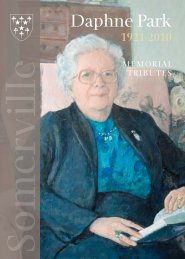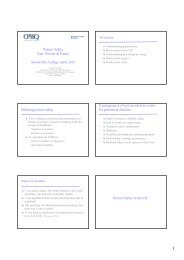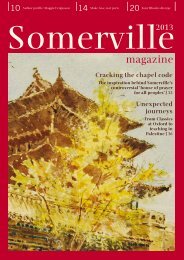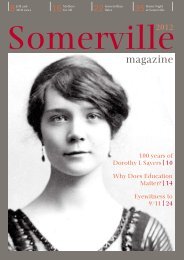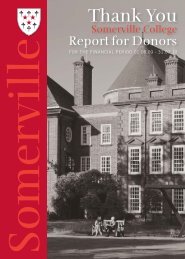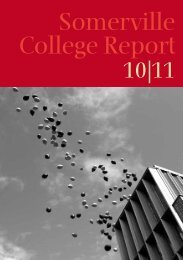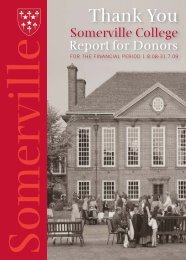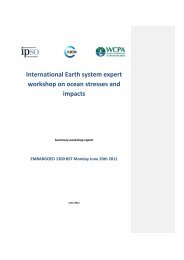magazine - Somerville College - University of Oxford
magazine - Somerville College - University of Oxford
magazine - Somerville College - University of Oxford
You also want an ePaper? Increase the reach of your titles
YUMPU automatically turns print PDFs into web optimized ePapers that Google loves.
<strong>Somerville</strong> Magzine | 17<br />
A quick step in<br />
Ethiopia’s slow lane<br />
NICK MARTLEW<br />
(2002, PPE)<br />
Oxfam’s humanitarian policy advisor in Ethiopia describes his<br />
patient, painstaking struggle against the urgencies <strong>of</strong> poverty.<br />
I’ve only just<br />
begun to<br />
understand<br />
this huge, ancient,<br />
devastatingly<br />
complex country<br />
It was in one <strong>of</strong> the regular one-on-one meetings<br />
with the Principal that I said it. Dame Fi (as we called<br />
her – affectionately, <strong>of</strong> course) was quite struck by the<br />
phrase: ‘how time can move both fast and slow amazes<br />
me.’ I didn’t tell her it was robbed from a song.<br />
My point back then was that an afternoon in the library<br />
could feel like an endurance test, while an eight-week<br />
term would be over before you could say ‘reading list’.<br />
Fast and slow at the same time. It’s a paradox that I’m<br />
still grappling with.<br />
These days I’m the humanitarian policy adviser for Oxfam<br />
in Ethiopia. To decode that, I take the lessons from<br />
Oxfam’s work with livestock or water with half a million<br />
or so Ethiopians and try to persuade the people who<br />
matter – local government, the United Nations, Western<br />
governments – to put these lessons into practice for the<br />
millions that our programmes can’t reach.<br />
In my work, the quick-slow conundrum is at times painfully<br />
obvious. Oxfam, like other agencies and the Ethiopian<br />
government, has to react as fast as humanly possible to<br />
outbreaks <strong>of</strong> disease or reports <strong>of</strong> extreme water or food<br />
shortages. That is the fast. The slow is the change that is<br />
needed to stop these emergencies from happening in the<br />
first place. Disasters here are mainly a function <strong>of</strong> poverty<br />
(in all its dimensions), not <strong>of</strong> some external shock like a<br />
tsunami or earthquake. Poverty won’t be eradicated here<br />
quickly, so disasters will keep on happening. Put simply,<br />
we have to work at the speed <strong>of</strong> the hare and the tortoise<br />
at the same time.<br />
Looking at this from a more personal perspective, I’ve<br />
been in this job since March 2009 and the months have<br />
poured away. Yet I feel as though I’ve only just begun to<br />
understand this huge, ancient, devastatingly complex<br />
country. It’s a luxury to have an opportunity like this –<br />
to pause from the frenetic working life and reframe the<br />
fast-slow conundrum in a positive way: small decisions<br />
made in the rush <strong>of</strong> the day-to-day can have a truly<br />
lasting impact.<br />
A personal example: in the heady days <strong>of</strong> my first year at<br />
<strong>Somerville</strong>, I decided to apply to join a small HIV and AIDS<br />
project in Kenya. I was accepted and was able to take this<br />
first trip to Sub-Saharan Africa thanks to a travel grant from<br />
the <strong>College</strong>. That started a journey that has taken me here<br />
to Ethiopia, via the Sub-Saharan African politics paper<br />
as part <strong>of</strong> PPE, an MA course in International Politics at<br />
Sheffield, a hard slog up the ladder at Oxfam, and a year in<br />
the Democratic Republic <strong>of</strong> the Congo.<br />
In 1984, a spark burst into the daily life <strong>of</strong> Bob Geld<strong>of</strong>,<br />
ignited by Michael Buerk’s report from the famine in<br />
Ethiopia. Twenty-five years on, I chaperoned Sir Bob around<br />
Ethiopia. I had been 18 months old when that spark was<br />
struck. Now Geld<strong>of</strong> wanted to see the Ethiopia <strong>of</strong> the<br />
21st century. Among Bob’s entourage were a couple <strong>of</strong><br />
hedge fund managers. Though they saw the hunger and<br />
immediate suffering, they seized on the change <strong>of</strong> the last<br />
25 years as well as the long term prospects for change:<br />
futures markets, commodity exchanges, communities being<br />
given the support to build their own visions <strong>of</strong> the future.<br />
Change, development, progress – it takes time. But we<br />
only get there by moving through the pressing, immediate<br />
decisions, taking – and giving – opportunities whenever<br />
and however we can. While visiting Oxfam’s work with<br />
honey farmers in central Ethiopia, one <strong>of</strong> the visiting hedge<br />
fund managers promised them computers so they could<br />
better link in with the private sector. Years ago, I was given<br />
a bursary by <strong>Somerville</strong> that allowed me to concentrate<br />
on studies rather than worry about money. Whatever the<br />
circumstance, opportunities grasped or given in time’s fast<br />
lane can show their value only with the passage <strong>of</strong> time –<br />
patient, slow time.



